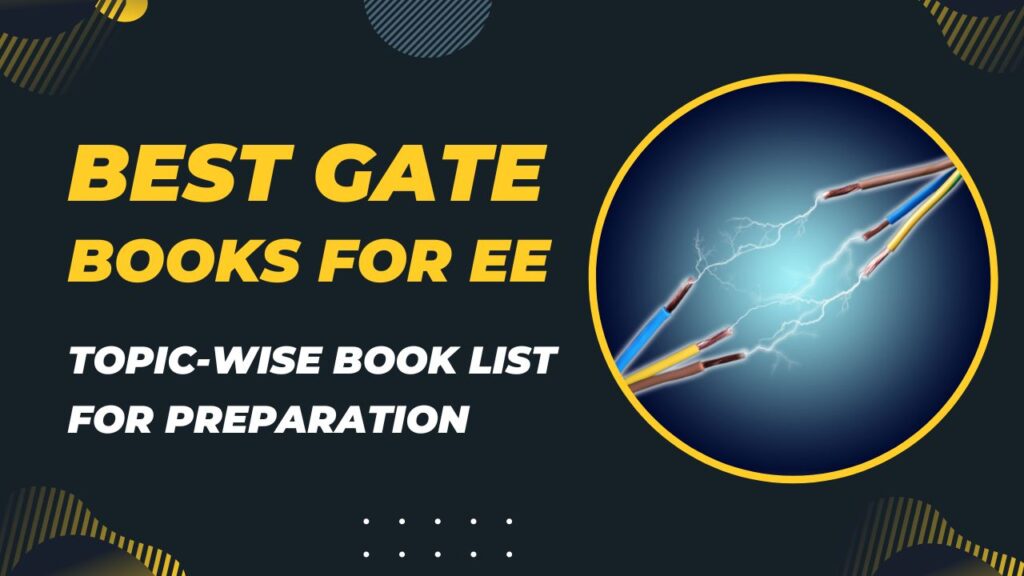This article will completely focus on the Best GATE Books for EE. GATE Electrical Engineering’s Top Books. As they prepare for GATE EE 2026, students are actively searching for study materials! Their chances of passing the GATE exam are increased when they consult the EE 2026 books.
Download Free GATE EE Notes by Toppers
In order to avoid missing anything at all, many students also plan to consider the top three to four books and then make the most of those resources! With their simple style, the best books for GATE Electrical Engineering 2026 will aid in a deeper mental grasp of the subjects. To assist you in preparing for the 2026 GATE EE exam, we will include a wealth of resources in this article. Now let’s get started!
Best GATE Books for EE: Topic-wise Book List for Preparation
Due to the extensive syllabus, passing the GATE exam needs perseverance and commitment. Based on suggestions from numerous coaching centres, subject matter experts, and past GATE winners, we are offering the finest books for GATE electrical engineering. The following is a list of GATE 2026 electrical engineering books:
Best GATE Books for EE
The major topics of the Electrical Engineering GATE 2026 exam are Engineering Mathematics, Electric Circuits, Electromagnetic Fields, Signals and Systems, Electrical Machines, Power Systems, Control Systems, Electrical & Electronic Measurements, Analog & Digital Electronics and Power Electronics.
| Section | Important Topics | Books |
|---|---|---|
| Engineering Mathematics |
|
|
| Electric Circuits |
|
|
| Electromagnetic Fields |
|
|
| Signals and Systems |
|
|
| Electrical Machines |
|
|
| Power Systems |
|
|
| Control Systems |
|
|
| Electrical & Electronic Measurements |
|
|
| Analog & Digital Electronics |
|
|
| Power Electronics |
|
|
Best GATE Books for EE: Examination Pattern
Candidates preparing for GATE 2026 for Electrical Engineering exam should definitely know the exam pattern very clearly. The table below shows the complete status on the pattern of the examination like Number of Questions in Paper, Number of Sections, Topic-wise Weightage, Duration of Exam, etc.
| Particulars | Details |
|---|---|
| Number of Questions in Paper | 65 |
| Number of Sections | Section 1 – General Aptitude Section 2 – Mathematics and Electrical Engineering |
| Topic-wise Weightage | General Aptitude – 15% Mathematics – 13% Electrical Engineering – 72% |
| Pattern of Questions | Multiple Choice Questions (MCQs) and Numerical Answer Type Questions (NAT) |
| Duration of Exam | 3 Hours |
| Marking Scheme | Test Paper has questions carrying 1 mark and 2 marks. ⅓ negative mark for incorrect answer. |
GATE 2026 Electrical Engineering: Subject Weightage
Students going to take the GATE 2026 Electrical Engineering Exam should be aware of the Subjects and their weightage. knowing weightage of the subjects is very important as this will give them the idea on which subject to give more attention too. In the core subject of Electrical Engineering, Engineering Maths holds the 13%. then Power Systems and Electrical Machines holds the 11%. For more details check the table below.
| Subjects | Avg Marks |
|---|---|
| General Aptitude | 15 |
| Engineering Maths | 13 |
| Network Analysis | 7 |
| Signals & Systems | 8 |
| Control Systems | 9 |
| Digital Electronics | 4 |
| Power Systems | 11 |
| Electrical Machines | 11 |
| Power Electronics | 9 |
| Analog Electronics | 6 |
| EMFT | 4 |
| Measurements | 3 |
FAQs on the Best GATE Books for EE
Which books are the best for preparing for the GATE in electrical engineering?
Among the top books for GATE electrical engineering preparation are Transient Analysis of Electric Power Circuits by Arieh L. Shenkmann, Engineering Electromagnetics by William H. Hayt, Control Systems Engineering by Nagrath and Gopal, and Digital Design by M. Morris Mano.
Which engineering mathematics book is the best?
The best book for engineering mathematics in GATE Electrical Engineering is Advanced Engineering Mathematics by E. Kreyszig.
Where can I locate the greatest preparing materials for GATE Electrical Engineering?
The greatest GATE Electrical Engineering books are available in bookshops and online. GATE EE preparation books are available for buy or download on numerous trustworthy websites. Make sure the books provide thorough coverage of important subjects, provide solved examples, and are in line with the most recent GATE syllabus. To select the best study materials, ask instructors, top students, or reliable sources for recommendations.
In GATE EE, which subjects are given the most weight?
Power Systems, Electrical Machines, Control Systems, and Engineering Mathematics usually have the highest weight, according to past years and trends.
In GATE EE 2026, how much weight is given to electrical machines?
Electrical Machines is one of the highest-scoring parts, usually contributing 10–12 points.
In the GATE EE Syllabus 2026, how much weight is given to general aptitude?
For all GATE exams, including Electrical Engineering, the General Aptitude part is worth 15 points.
Does the GATE EE 2026 syllabus include Signals and Systems?
Indeed, with an average score of 8–10, Signals and Systems is an important subject. It incorporates the Sampling Theorem, Fourier/Laplace transforms, and LTI systems.
In GATE EE, what kinds of questions are asked?
Multiple Choice Questions (MCQs), Multiple Select Questions (MSQs), and Numerical Answer Type (NAT) questions are all included in the GATE EE exam.
